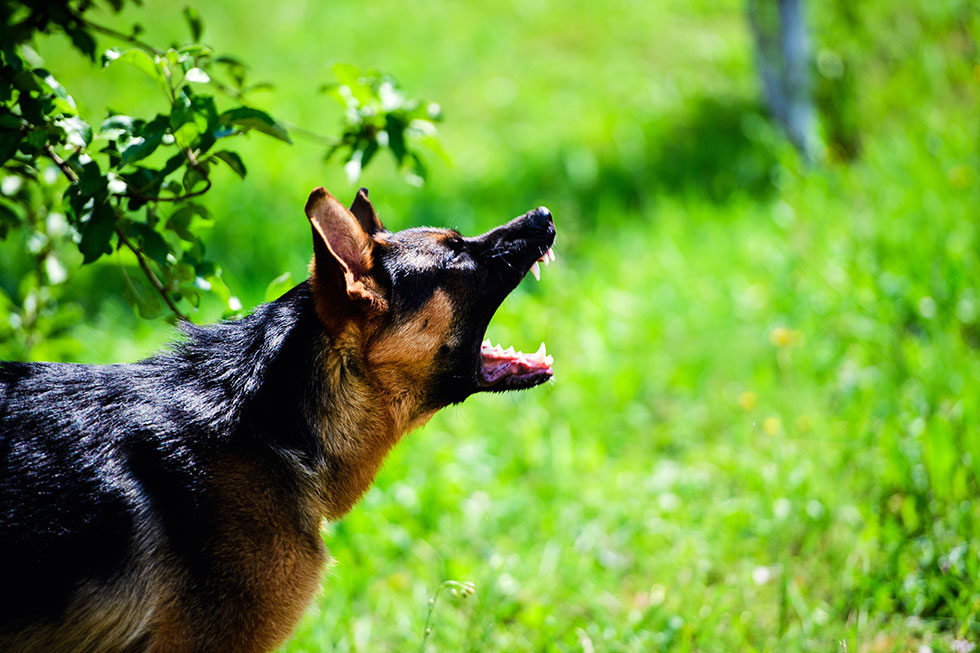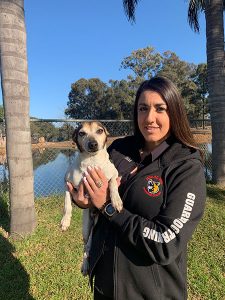Dog Aggressive behaviour to look out for
 September 10, 2019
September 10, 2019
It seems every week lately we are hearing about dog attacks in the news, with both people and other animals being injured, or worse, by an aggressive dog. Whether your dog is prone to aggression, or he has an out-of-character reaction to a situation, it’s important to know the signs and to know when you should be concerned.
Nadia Crighton catches up with the experts to get the rundown on aggressive behaviour and the signs all owners need to look out for.
For many dog owners, this scenario is not an uncommon sight – two dogs going nose-to-nose at the local off-leash park. Hackles raised, teeth baring, and normally owners shouting!
More times than not, the situation is defused by a simple command, or the dogs quickly get over the disagreement and move on. For some this could be a simple argument over a toy, being over-friendly with another dog, or being too boisterous. However, if this type of behaviour is becoming a common occurrence in your dog’s life, it could become an issue.
So, when should you be concerned about your dog’s behaviour?
Meet Kirsten Lambros. A Senior Dog Handler from Pets Training & Boarding. When it comes to aggression Kirsten is quick to remind owners that it’s important to act quickly.
“Most dogs will generally act out of their normal characters, showing teeth, growling, not approaching, lunging towards people or dogs, becoming terrified and cowering when being handled,” she says. “A lot of knowing and understanding your dog comes down the body language in which you dog displays.”
Kirsten notes the following body signs to look out for that could signal that your dog is not feeling secure that can lead to an aggressive reaction.
- How your dog holds their tail, high, low, medium, tucked under?
- How your dog holds their ears, pricked and alert, relaxed, flat.
- How your dog displays their eyes, wide open, semi closed, showing the whites of the eyes?
- Does your dog shake in new environment?
- Does your dog do excessive lip licking?
- Does your dog pant excessively and it’s not a hot day?
“A lot of these behaviours are related to your dog being stressed and uncomfortable in different circumstances, your dog being uncomfortable can lead to a fear-based aggression,” she warns.
Knowing these signs and understanding when your dog is feeling threatened or insecure can help alleviate the issue escalating.
“Most people miss these signs and then it’s too late, once a dog knows that people can become scared if they growl or lunge or bite – they will continue to display this behaviour to keep people or other dogs away as it worked the first time around,” she explains. “The key is knowing and understanding how your beloved pet is feeling.”
What About Training?
A well-trained, well-mannered dog, is less likely to exhibit signs of fear based aggression or aggressive tendencies. This can come down to many factors including owners who are aware of their dogs body signs and that something is not quite right.
A dog that has a very strong communication bond with their owners (AKA training) is also less likely to feel threatened in situations, as their ‘leader’ (AKA you) has got the problem in hand.
Aggression cannot be trained out of a dog. However, a professional dog handler can help you understand your dog’s aggression and allow you to control this aspect of your pet.
“Aggression will be instilled and displayed by your dog its entire life, all dogs can be aggressive, some display this behaviour more freely while others keep it hidden away,” she says. “The key to all aggression is control, once you have control of your dog you can amend this negative behaviour. More exposure, and by this I mean seeking professional advice, to ensure your dog becomes more obedient to your tone of voice and body language rather than regressing.”
Kirsten has helped countless dogs, and owners with aggression issues. However, she is quick to remind readers that success is based on the hard work owners are willing to put in to their dogs.
“Our success rate solely relies on the hard work the owners wish to put in once their pet is collected from doggie boot camp,” she says. “However, we do offer a lifetime guarantee to assist clients throughout that particular lifetime if they have new problems, or feel like they need further assistance in controlling their dog. We do all the hard work, but the owners need to ensure they keep it up.”

If you are struggling with your dog’s behaviour, you are not alone. Don’t be afraid to seek help and improve the bond you share with your dog, while reaping the rewards of well-behaved, and controlled, canine companion.
“All dogs who arrive into our care with aggression problems are handled with caution and care,” she says. “As we are a large boarding facility dog aggression can be catered to a lot easier as we have many breeds, ages, personalities in which we can socialise your aggressive pet with.”
Aggression will not get better on its own, and more times than not, will become worst. Once your dog realised this behaviour works – e.g. the other dog goes away, or the child backs off, it will just reinforce the behaviour. The quicker you seek help, the better.
“In terms of people-aggression this can become a challenge, we use our office staff as bait (no one is hurt in the process), we use our volunteers – our office staff and volunteers are classed as strangers to these particular dogs – so the more positive exposure they have the less likely the dog becomes anxious or aggressive in this scenario. There are many different ways in helping those individual dogs – at the end of the day we cater to their individual needs and requirements, so every technique is different depending on the situation.”
Pets Training & Boarding is situated in NSW and offers a range of services including: in-house dog training, boarding (cats and dogs), and grooming. They specialise in behaviour training, breed training ad puppy training with patience, persistence and praise. For more information check-out www.petstrainingandboarding.com.au
*first published at www.animalfriendlylife.com.au find article here
